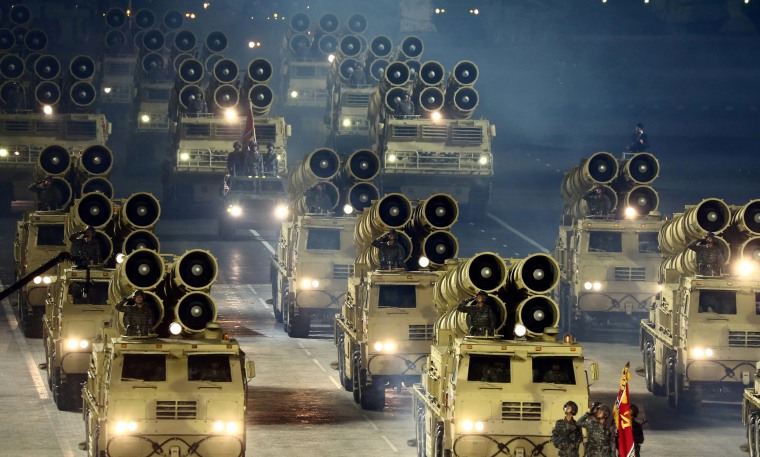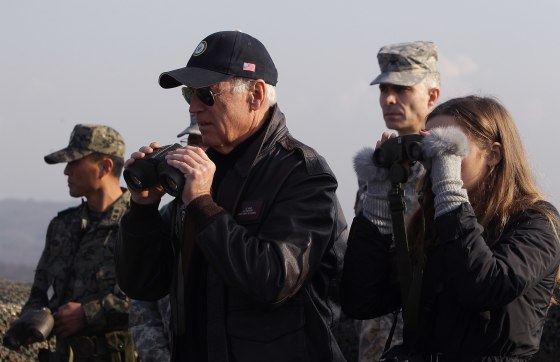President-elect Joe Biden is unlikely to declare that he's fallen in love with North Korean dictator Kim Jong Un. Instead he looks set to ditch the bromance-tinged pageantry favored by President Donald Trump and replace it with more workmanlike ground-level diplomacy.
As levelheaded as this sounds, many experts say there is a danger Biden could repeat the mistakes of his old boss, Barack Obama, whose "strategic patience" as president has been criticized by some as being far too passive, allowing North Korea to build up its nuclear arsenal.
Whatever tactics Biden adopts, a central fact remains: North Korea is unlikely to ever willingly give up its nuclear weapons, which it sees as an insurance policy against foreign attempts to overthrow its dynastic regime.
"For all the faults with the Trump administration's very unconventional way of approaching North Korea, my main concern is that Biden's approach will look very similar to Obama's," said Cristina Varriale, a research fellow in proliferation and nuclear policy at the Royal United Services Institute, a London think tank.
"That didn't really work," she said. "By the time Trump took office in 2016, North Korea had got to a point where they were quite advanced in terms of where they were with their nuclear program."
Trump's North Korea policy, a far cry from his predecessor's, was something of a roller coaster.
He promised to respond with "fire and fury" as North Korea conducted a flurry of missile and nuclear tests in 2017, before becoming the first sitting U.S. president to step foot inside North Korea and to meet its leader.
For all his bonhomie, Trump has little to show in terms of denuclearization.
Kim has never stopped building nuclear warheads and the missiles needed to deliver them, according to U.S. officials and analysts. He has slowed testing, but many experts say that this owes more to his satisfaction with the milestones he has achieved, rather than any goodwill toward Washington.
Download the NBC News app for breaking news and politics
North Korea has 30 to 60 nuclear warheads, watchdogs say. Pyongyang claims it has the ability to strike the U.S. mainland, although not all experts are sure that is indeed true.
Whereas Trump was effusive in his praise of Kim, making no mention of his well-documented human rights atrocities, Biden has likened the leader to the Nazis.
"He's talked about his good buddy, who's a thug — a thug," Biden said of Trump's friendship with Kim during the final presidential debate last month. On Trump's argument that a "good relationship" with Kim was better than nuclear war, Biden retorted: "We had a good relationship with Hitler before he in fact invaded Europe. Come on."
Biden has clashed with North Korea before, calling Kim a "murderous dictator" last year, which prompted the country's state-controlled media to describe Biden as a "rabid dog" who "must be beaten to death with a stick."

Perhaps unsurprisingly North Korea has not yet acknowledged Biden's projected presidential win.
Biden's aggressive stance will certainly have been noted in Pyongyang. But it's still in Kim's interests to come to some kind of deal with the next White House, some experts say. His country continues to labor under crushing international sanctions, widespread flooding and suspected outbreaks of Covid-19.
That need to shake things up may also mean Kim could attempt some form of provocation before or after Biden's expected inauguration on Jan. 20, perhaps in the form of a new missile test, according to John Nilsson-Wright, a senior research fellow at Chatham House, a London think tank.
Ultimately, though, progress is not impossible.
Experts say a deal could cap or freeze the North Korean nuclear program or even reach some form of arms-control agreement to reduce its stockpile. All this will be closely tied to Washington's stance on neighboring China and South Korea.
"But having acquired nuclear weapons, no credible North Korean leader — and certainly not this one — could really entertain the possibility of full denuclearization," said Nilsson-Wright, who also teaches international relations and Japanese politics at Cambridge University.

